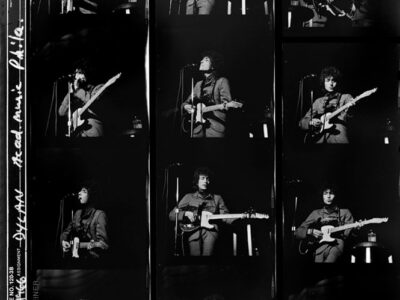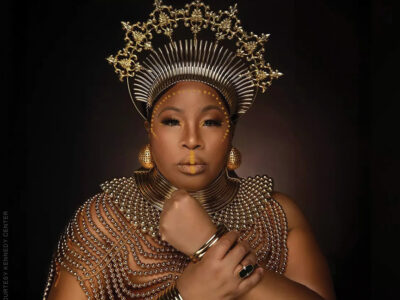
Evan Thomas plumbs multiple identities to create a different kind of Christian pop music.
It was 4 a.m. when Evan Thomas W’20 woke up, stomach rumbling. As he waited for some ravioli to heat in the microwave, a melody began forming in his head. The tune grew into a full song while he ate, but then he went back to sleep without writing down or recording any of it.
Yet when he woke up the next day, somehow he remembered the entire thing.
Thomas eventually premiered that song, “Slowly Get Lost,” at his fundamentalist church in Lancaster, Pennsylvania—an institution that had long been at the center of his life, but also caused him anguish and uncertainty. Last year his Penn a cappella group, Dischord, performed the song at a concert. And now Thomas’s 4 a.m. creation is one of seven tracks included on his debut album, Foundations, which came out on August 21—his 24th birthday.
On the phone from his parents’ home in late summer, Thomas says “Slowly Get Lost” was inspired by fellow alum John Legend C’99 Hon’14’s early hit “Ordinary People.” In fact, Legend’s a vocalist to whom he’s occasionally been compared. (Recently when he sang at his grandmother’s church, where most congregants are Caribbean and elderly, he says a woman stood up and screamed “John Legend! John Legend!” after he finished.)
Both songs pair gentle piano accompaniment with smooth vocals, but where “Ordinary People” explores the complexities of romantic relationships—and Legend has denied any autobiography in its lyrics—“Slowly Get Lost” has a more religious slant and was pulled directly from Thomas’s own life. “It’s about love, and love of God, and the acceptance from God that I needed to experience in order to get to where I am now,” he says.
Similar themes extend throughout Foundations, which incorporates styles ranging from Afrobeat, gospel, and blues to contemporary Christian, pop, and trap. Thomas says the tracks follow his personal journey over the past decade, including bouts with depression and suicidal thoughts after coming out as a gay man, the times he felt like all of his life’s foundations were crumbling, and finally, his newfound pride and self-acceptance. (He describes his current faith as “some form of Christianity.”)
In “Cool Kid Rules,” one of three singles he released in advance of the album, Thomas explores his difficulty fitting in socially. “I’m cool with just being famous on the inside,” he sings to a tropical, reggaeton-style beat. “I’ve never been cool, so I don’t know the cool-kid rules. Are we playing the same game?”
He hopes fans of his music will include others who struggle to find their place in the world. “I never felt like I belonged and was fully accepted anywhere,” he says. “I was the only gay kid at church. I was the only Black kid in a sea of white faces. In college, I certainly felt like a minority—it’s not cool to be Christian on a college campus. Someday, when I’m able to put on a show, I want people to come who are misfits and feel like they can be accepted and loved by their Creator.”
Growing up gay in Lancaster, which he calls “the Bible Belt of the North,” Thomas spent many Sundays inside his church hearing his sexuality called a sin. When he scraped together the courage to come out to his parents at age 16, “they said God had a better plan for my life,” he remembers. “I spent the next six years trying to make that plan come about.”
First came the counselor, who he later realized was actually performing “conversion therapy” on him—a controversial and widely discredited practice that aims to change someone’s sexual orientation. “We talked about what the Bible says about homosexuality, and she explained to me how it was wrong and how I wasn’t born gay,” he says.
“After two months, I pretended, ‘Oh, this is really working. I’m really feeling better,’” he remembers.
He deferred an acceptance to Wharton and went on a yearlong mission trip to Mexico instead, “hoping that God would work some sort of miracle.” When that didn’t happen, he stayed in Mexico a second year, still hoping to somehow return home straight.
Back in the US, he brought his secret with him to Penn. He became deeply involved in several Christian student communities on campus, went to church, and pursued a concentration in management at Wharton. He also joined Dischord, singing both tenor and bass parts, and became the group’s music director.
“That group changed my life,” he says now. “I wrote some of the craziest arrangements for that group—harder than anything any of them had ever done, and harder than anything I’d ever done, too. I also learned how to lead creative people and how to translate all the musical ideas that had been swimming around my head into something that’s learnable, like sheet music.”
It wasn’t until last year that Thomas fully shed the conversion therapy and began coming out to his family and friends. He told his parents that being gay wasn’t something he could change; they would have to accept their son as he is. “From there, it evolved from I’m gay to I’m making an album about it and telling the world,” he says.
Now that album’s title song, “Foundations,” reflects the turning point—a time when Thomas felt like he was losing everything: his family, his friends, the church, his career goals. “I can’t live the life I wanna live and I can’t live the lie I’m s’posed to live, so what the hell am I s’posed to do?” he sings in a tender, soulful voice. “The foundation’s crumbling. It was never meant to bear the weight of ten thousand hopes, dreams, and empty prayers.” The album’s final track, an upbeat tune called “Like I Do,” reveals the happy ending that lay just ahead, made clear in the triumphant, repeated lyric “you could never love me like I do.”
While the world battles COVID-19, Thomas says this self-quarantine period has actually been “a huge blessing in disguise for me.” When Penn closed down after spring break, he stayed at home with his parents in Lancaster—something he wasn’t eager to do. “But I think the extra time we’ve had to spend together has allowed them to really understand who I am and what I’ve been through,” he says. “Their perspective has really changed.”
The pandemic also granted him time to finish Foundations, which Alex Graf W’22 helped cowrite and produced on his label, Grafik Music. Now Thomas is working on a Sachs Program-funded project with Harold Milton-Gorvie C’21 and Shalom Obiago C’21: a “visual EP” that will set several of his songs into a short film rooted in his experiences, starting with conversion therapy. Along with his struggles around sexuality, “we’re also really trying to capture a lot of what’s going on with Black Lives Matter” in the film, he says.
Whether it’s through a single song, his entire album, or the new video project, Thomas says he’s looking to transmit a simple but important message in his work: “I want other people to know that they can make it through hard stuff.”
—Molly Petrilla C’06




